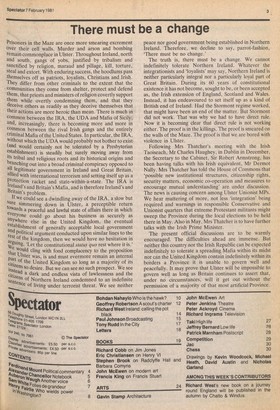There must be a change
Prisoners in the Maze are once more smearing excrement over their cell walls. IyIurder and arson and bombing remain commonplace in Ulster. Throughout Ireland, north and south, gangs of yobs, justified by tribalism and sanctified by religion, maraud and pillage, kill, torture, steal and extort. With enduring success, the hoodlums pass themselves off as patriots, loyalists, Christians and Irish. They differ from other criminals to the extent that the communities they come from shelter, protect and defend them, that priests and ministers of religion covertly support them while overtly condemning them, and that they deceive others as readily as they deceive themselves that their actions are more heroic than mean. There is much in common between the IRA, the UDA and Mafia of Sicily; and, increasingly, there is becoming more and more in common between the rival Irish gangs and the entirely criminal Mafia of the United States. In particular, the IRA, Without which the UDA would probably not bother to exist, (and would certainly not be tolerated by a Presbyterian establishment) is steadily but surely moving away from its tribal and religious roots and its historical origins and branching out into a broad criminal conspiracy opposed to all legitimate government in Ireland and Great Britain, allied with international terrorism and setting itself up as a protection racket and state-within-a-state, The IRA is Ireland's and Britain's Mafia, and is therefore Ireland's and Britain's problem. if we could see a dwindling away of the IRA, a slow but sure simmering down in Ulster, a perceptible return towards a peaceful and lawful state of affairs there in which everyone could go about his business as securely as anYwhere else in the United Kingdom, the eventual establishment of generally acceptable local government as r argument conducted upon similar lines to the rest of the kingdom, then we would have no hesitation in tvarguing, 'Let the constitutional status quo rest where his.' e would cling with fond complacency to the proposition mat Ulster was, is and must evermore remain an internal epiatrt of the United Kingdom so long as a majority of its insitzens so desire. But we can see no such prospect. We see citi ead a dark and endless vista of lawlessness and the senz.ens of Northern Ireland condemned to an indefinite tence of living under terrorist threat. We see neither peace nor good government being established in Northern Ireland. Therefore, we decline to say, parrot-fashion, 'There must be no change.'
The truth is, there must be a change. We cannot indefinitely tolerate Northern Ireland. Whatever the integrationists and 'loyalists' may say, Northern Ireland is neither particularly integral nor a particularly loyal part of Great Britain. During its 60 years of constitutional existence it has not become, sought to be, or been accepted as, the Irish extension of England, Scotland and Wales. Instead, it has endeavoured to set itself up as a kind of British end of Ireland. Had the Stormont regime worked, that might have been an end of the matter. But Stormont did not work. That was why we had to have direct rule. Now it is becoming clear that direct rule is not working either. The proof is in the killings. The proof is smeared on the walls of the Maze. The proof is that we are bored with violence in Ulster.
Following Mrs Thatcher's meeting with the Irish Taoiseach, Mr Charles Haughey, in Dublin in December, the Secretary to the Cabinet, Sir Robert Armstrong, has been having talks with his Irish equivalent, Mr Dermot Nally. Mrs Thatcher has told the House of Commons that 'possible new institutional structures, citizenship rights, security matters, economic co-operation and measures to encourage mutual understanding' are under discussion. The news is causing concern among Ulster Unionist MPs. We hear muttering of more, not less 'integration' being required and warnings in responsible Conservative and Unionist quarters that extreme Protestant militants might sweep the Province during the local elections to be held there in May. Also in May, Mrs Thatcher is to have further talks with the Irish Prime Minister.
The present official discussions are to be warmly encouraged. The difficulties ahead are immense. But neither this country nor the Irish Republic can be expected indefinitely to tolerate a spreading Mafia within its midst nor can the United Kingdom contain indefinitely within its bdiders a Province it is unable to govern well and peacefully. It may prove that Ulster will be impossible to govern well as long as Britain continues to assert that, under no 'circumstances, will it get out without the' permission of a majority of that most artificial Province.






































 Previous page
Previous page